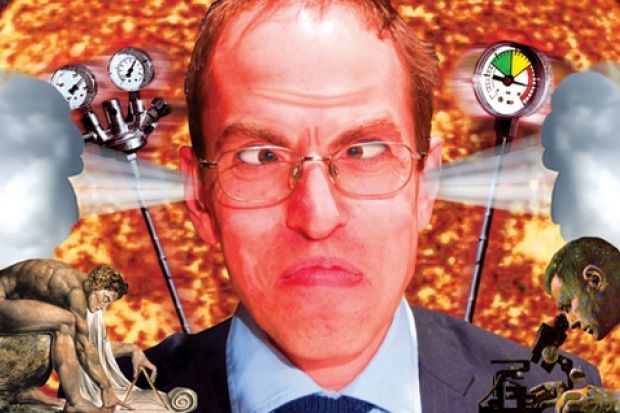It sounds like a parody of a Hollywood B-movie: Science Under Attack (Horizon, BBC Two, Monday 24 January, 9pm). But it's happening now, in a laboratory near you. Insults, hatred and death threats directed at those who have the audacity to try to add to the sum of human knowledge or save us from the consequences of our folly.
Sir Paul Nurse, president of the Royal Society, is a genial soul with the bewildered air of a hobbit who has strayed out of Middle-earth to find himself trapped in Killzone 3. He set out to investigate, without so much as a microscope, why there is so much loathing of the white-coats.
The topic that seems to excite most enmity is global warming. Is it man-made or just part of the Earth's long-term weather patterns? Sir Paul flew off to Nasa to examine the evidence. The Space Centre has information from hundreds of satellites that show a correlation, over the past 50 years, between emissions of carbon dioxide and an increase in the Earth's temperature. Sir Paul's flight had caused the planet's temperature to rise a little more, but it's the hot fury of climate-change deniers that really sets the mercury soaring.
You feared for Sir Paul because, back in London, an ideologue could leap on him from any doorway. He was on the way to meet James Delingpole, who writes for The Daily Telegraph, a newspaper that persists in naming itself after an obsolete technology. Mr Delingpole, who describes himself as being "right about everything", presumably in the political rather than the factual sense, was one of those who gleefully stuck the knife into the University of East Anglia's Climatic Research Unit, claiming that the leaked emails showed the distortion of data and the elimination of findings that challenged the global warming hypothesis.
James was good enough to lecture Sir Paul on the dos and don'ts of science. The president of the Royal Society listened politely. When Sir Paul pointed out that science was based on consensus, Mr Delingpole disagreed. Sir Paul decided it was time to introduce a little reason into the debate. There is a consensus on how to treat cancer. If you had it, he said to his interlocutor, would you say to your consultant, "I reject the various methods of dealing with the disease because I have been doing my own research"? Mr Delingpole opened his mouth. Eventually he managed to say, "I don't accept your analogy. Shall we talk about 'Climategate'?"
The ever-amiable Sir Paul agreed. He explained the process of peer-reviewed papers to Mr Delingpole, who seemed to understand the principle very well even though he had never read one. "It's not my job," he declared. "I have neither the time nor the expertise." He said he relied on those who did have the time and the expertise, but not, funnily enough, on Sir Paul. So how does Mr Delingpole decide which scientists to believe? He didn't say.
Sir Paul reminded us that scientists test their hypotheses. They do controlled experiments. They submit their work to the scrutiny of their colleagues. They try to prove themselves wrong. None of this, he said, is true of their opponents, who seek to support their case by "cherry-picking" the data. But Sir Paul also said that scientists were partly to blame for their public image. They need to engage with the media, to explain that science is a force for progress and ultimately for good.
They haven't a hope. Sir Paul's belief that rational argument will clear away the clouds of misunderstanding should have been dashed by his encounter with Mr Delingpole. What counts, as always, is not what is true, but what you can make people believe. And vested interests, particularly conservative and libertarian groups, are adept at doing just that. The Information Council on the Environment, for example (a collection of US coal companies), was given funding for a pilot study intended to demonstrate that "that a consumer-based media awareness program can positively change the opinions of a selected population regarding the validity of global warming".
Against that background it seems a little fanciful to discuss the nature of ethics. Or maybe not. Anyway, that's just what Professor Michael Sandel did in Justice: A Citizen's Guide to the 21st Century (BBC Four, Saturday 29 January, 8pm). Jeremy Bentham's philosophy that government policy should seek the greatest happiness, not the greatest misery, of the greatest number is one that the coalition might like to consider. Then again, as the Prof pointed out, Bentham makes no distinction between different kinds of pleasure. If the majority prefer to watch The X Factor instead of learning about science, that's OK. We live in a free market and mustn't mess it up by worrying about such trifles as truth and morality.
Register to continue
Why register?
- Registration is free and only takes a moment
- Once registered, you can read 3 articles a month
- Sign up for our newsletter
Subscribe
Or subscribe for unlimited access to:
- Unlimited access to news, views, insights & reviews
- Digital editions
- Digital access to THE’s university and college rankings analysis
Already registered or a current subscriber?
